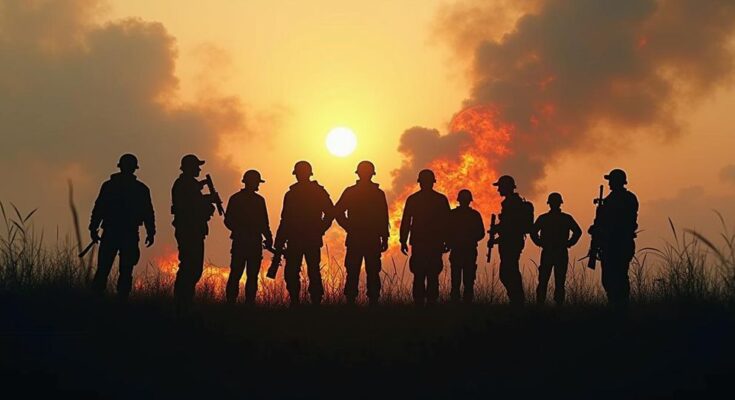The Wagner Group has launched a rebellion against the Russian military, led by Yevgeny Prigozhin, citing lack of support and accusations of attacks against its forces. This upheaval indicates a potential shift in the dynamics of the Ukraine conflict, with analysts suggesting that Wagner’s withdrawal could significantly impact Russian offensives. As the situation develops, it poses risks not only to Russia’s military strategy but also hints at deeper internal conflicts within the country.
The Wagner Group, a private military contractor, has instigated an armed rebellion against the Russian military, claiming negligence in troop support and accusing military officials of launching attacks against its forces. Led by Yevgeny Prigozhin, a figure previously allied with President Vladimir Putin, this rebellion has sparked widespread uncertainty within Russia, coinciding with Ukraine’s counteroffensive maneuvers and increasing Western pressure, as rumors of an impending civil conflict begin to surface. This insurrection is not an isolated event; it represents a culmination of tensions that have been escalating over time. Recently, Defense Minister Sergei Shoigu, with President Putin’s backing, mandated that all mercenaries, including those from Wagner, must formalize contracts with the defense ministry. This directive posed significant challenges for Prigozhin, who has been striving to strengthen his influence in the region. Since his public refusal to comply with this order, Prigozhin alleged that the defense ministry had deliberately ceased ammunition supplies to his troops, particularly during confrontations in Bakhmut. He has publicly condemned the military leadership for their lack of support, articulating his frustration through statements such as, “These are someone’s fathers and someone’s sons,” referencing the casualties suffered by his forces. The situation has led Prigozhin to threaten a withdrawal from Bakhmut, where Wagner has played a pivotal role in recent military actions. The prospects of a Wagner withdrawal raise critical concerns regarding the ongoing conflict in Ukraine. Analysts suggest that such a move could signify an end to a major phase in Russia’s military operations, as Wagner forces have been essential in the limited successes observed in the winter offensive. Yohann Michel from the International Institute for Strategic Studies noted that the removal of Wagner from the frontline operations would likely jeopardize Russia’s current strategy. Moreover, U.S. intelligence assessments indicate that losing Prigozhin could significantly impact the effectiveness of Russian combat forces, as he currently plays a dual role as both a serious liability and a valuable asset to the Russian military’s operational capabilities. Recent reports indicate that Wagner forces are advancing towards Moscow, with claims of having occupied military headquarters in Rostov-on-Don and potentially moving through the Lipetsk region, heightening tensions with the Russian government significantly.
The Wagner Group has been a controversial entity in Russia, functioning under the auspices of private military operations while often serving the strategic interests of the Kremlin. The recent rebellion led by Yevgeny Prigozhin stems from a history of unaddressed grievances regarding military resource allocations, as well as a struggle for dominance between private militia factions and established military hierarchies. Tensions escalated when the Russian government mandated increased formalization of mercenary operations, resulting in allegations by Prigozhin of being systematically undermined by military officials. The implications of this rebellion could profoundly influence the ongoing conflict in Ukraine, already complicated by international dynamics and local resistance.
The rebellion by the Wagner Group, under Yevgeny Prigozhin, represents a significant threat to the stability of Russia’s military leadership amidst its ongoing struggle in Ukraine. The potential withdrawal of Wagner forces could mark a turning point in the conflict. Furthermore, the internal strife highlights the fragile nature of the coalition between private military contractors and the state, raising questions about the future effectiveness of Russian military operations. As the situation evolves, the ramifications for both domestic and international military strategies remain to be seen.
Original Source: www.livemint.com




